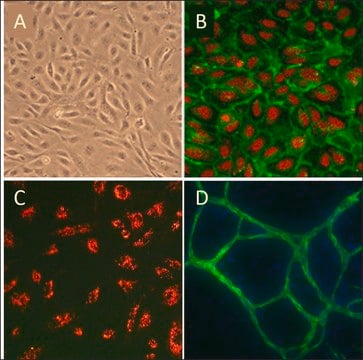306-05F
Human Cardiac Fibroblasts: HCF, fetal
Synonym(s):
Cardiac Fibroblasts, Fetal Cardiac Fibroblasts, HCF Cardiac Fibroblasts
Sign Into View Organizational & Contract Pricing
All Photos(2)
About This Item
UNSPSC Code:
41106514
NACRES:
NA.81
Recommended Products
biological source
human heart (normal)
Quality Level
packaging
pkg of 500,000 cells
manufacturer/tradename
Cell Applications, Inc
growth mode
Adherent
karyotype
2n = 46
morphology
fibroblast
technique(s)
cell culture | mammalian: suitable
relevant disease(s)
cardiovascular diseases
shipped in
dry ice
storage temp.
−196°C
General description
Lot specific orders are not able to be placed through the web. Contact your local sales rep for more details.
Cardiac fibroblasts are the most prevalent cell type in the heart, making up 60-70 % of all cells. HCF from Cell Applications, Inc. provide an excellent model system to study many aspects of human heart function and pathophysiology.
HCF has been utilized in a number of research publications, for example to:
HCF were also shown to express delayed rectifier IK, Ito, Ca2+-activated K+ current (BKCa), inward-rectifier (Kir-type), and swelling-induced Cl- current (ICl.vol) channels (Yue, 2013).
Cardiac fibroblasts are the most prevalent cell type in the heart, making up 60-70 % of all cells. HCF from Cell Applications, Inc. provide an excellent model system to study many aspects of human heart function and pathophysiology.
HCF has been utilized in a number of research publications, for example to:
- Determine that electrical coupling between cardiomyocytes and fibroblasts is mediated by large-conductance Ca2+-activated K+ channels that can be stimulated by estrogen receptor agonists (Wang, 2006, 2007); and show that antimitogenic effects of estradiol on HCF growth are mediated by cytochromes 1A1/1B1-and catechol-O-methyltransferase-derived metabolites (Dubey, 2005)
- Show that in response to mechanical stretch, cardiac fibroblasts release TGF-β which causes trombomodulin downregulation, increasing the risk of thromboembolic events (Kapur, 2007) and also induces cardiac fibroblast differentiation into myofibroblasts via increased Smad2 and ERK1/2 phosphorylation, that could be stimulated by endothelin-1 and inhibited by Ac-SDKP (Peng, 2010)
- Demonstrate that activation of G protein-coupled receptor kinase-2 (GRK2) prevents normal regulation of collagen synthesis in cardiac fibroblasts mimicking heart failure phenotype (D’Souza, 2011); identify FGF2 signaling pathway as potential target for modulating apoptosis in cardiac pathology (Ma, 2011) and investigate the roles of scleraxis (Bagchi, 2012) and AMPKα1 (Noppe, 2014) in scar formation following myocardial infarction
- Show that the KATP channel opener KMUP-3 preserved cardiac function after myocardial infarction by enhancing the expression of NO synthase and restoring MMP-9/TIMP-1 balance (Liu, 2011)
HCF were also shown to express delayed rectifier IK, Ito, Ca2+-activated K+ current (BKCa), inward-rectifier (Kir-type), and swelling-induced Cl- current (ICl.vol) channels (Yue, 2013).
Cell Line Origin
Heart
Application
human heart function, neointimal formation, vascular remodeling, myocardial repair, extracellular maintenance, signaling, toxicology, gene expression, structural support for cardiomycytes, synthesis of extracellular matrix, growth factors and cytokines
Components
Basal Medium containing 10% FBS & 10% DMSO
Preparation Note
- 1st passage, >500,000 cells in Basal Medium containing 10% FBS & 10% DMSO
- Can be cultured at least 8 doublings
Subculture Routine
Please refer to the HCF Culture Protocol.
Disclaimer
RESEARCH USE ONLY. This product is regulated in France when intended to be used for scientific purposes, including for import and export activities (Article L 1211-1 paragraph 2 of the Public Health Code). The purchaser (i.e. enduser) is required to obtain an import authorization from the France Ministry of Research referred in the Article L1245-5-1 II. of Public Health Code. By ordering this product, you are confirming that you have obtained the proper import authorization.
Storage Class Code
11 - Combustible Solids
WGK
WGK 3
Flash Point(F)
Not applicable
Flash Point(C)
Not applicable
Certificates of Analysis (COA)
Search for Certificates of Analysis (COA) by entering the products Lot/Batch Number. Lot and Batch Numbers can be found on a product’s label following the words ‘Lot’ or ‘Batch’.
Already Own This Product?
Find documentation for the products that you have recently purchased in the Document Library.
Customers Also Viewed
Our team of scientists has experience in all areas of research including Life Science, Material Science, Chemical Synthesis, Chromatography, Analytical and many others.
Contact Technical Service










